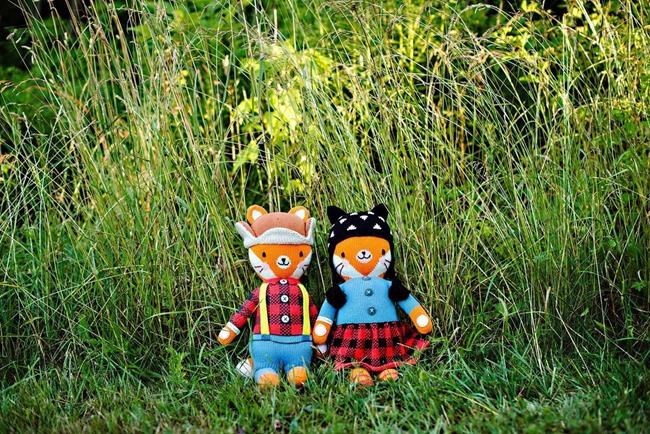
Dolls from the company Cuddle+Kind are shown in a handout photo. The company donates 10 meals for every hand-knit doll sold. THE CANADIAN PRESS/HO
October 18, 2016 - 6:00 AM
TORONTO - Derek Woodgate didn't know it at the time, but seeing a documentary about childhood malnutrition would change his life.
He watched the film last year and knows it was the catalyst that helped push him and his wife Jen to start Cuddle+Kind, a company that donates 10 meals for every hand-knit doll sold.
Mark Schwartz, an associate professor of business ethics, said it's becoming important for companies to show that they care about more than just the bottom line.
"Over the years, it's become much more mainstream," said Schwartz, who teaches at York University's School of Administrative Studies.
"The larger companies in the world, they really have no choice. All the industries realize that they have to be seen as giving back to the society and the community in which they operate."
He said customers may be more willing to choose businesses that share their same values or ethics, if all other factors, such as price, quality and services are the same compared to a competitor.
"There's a bigger impact when the contribution is more directly linked to the nature of your product and your service," said Schwartz.
"If you buy a pair of shoes, and you know a pair of shoes is going to a child in the developing world, it would make more of a difference. Or knowing that the farmers who are growing your coffee are treated fairly and that their communities are benefiting — I think the link is much more direct and much stronger."
Although there is little Canadian data tracking corporate social giving, a recent U.S. retail study by consulting firm PwC found that it's a topic that it is on the forefront of shoppers' minds.
The report, titled 2016 Holiday Outlook, says 60 per cent of consumers surveyed say they hold retailers who make charitable donations and work on sustainability and community involvement in high esteem. A third of consumers say they plan on spending more money at these retailers. The data was taken largely from a survey of more than 2,300 Americans and 200 retailers.
Derek Woodgate said customers like knowing that their purchase of a colourful hand knit doll also helps support fair wages for female artisans in Peru and also provide meals to Breakfast Club of Canada, World Food Program USA and Children's Hunger Fund, which feeds children in schools and orphanages around the world.
"First and foremost, as parents with three children ourselves, being able to provide nutrition so our children can thrive and other children can thrive was critical," he said.
"It just broke our hearts. It moved us to want to help."
When brothers Kalen and Derrick Emsley started Tentree in 2012, their mission was simple: how could they make money to plant more trees?
The pair had a carbon-offsetting company but wanted to expand their efforts, so they launched a casual clothing line that would plant 10 trees for every item purchased.
Four years and a deal on CBC's Dragon's Den later, Tentree now sells clothes in shops across Canada, the U.S. and Australia. In that time, it has planted more than 9.4 million trees, mostly in Madagascar and Ethiopia.
"We knew that it was a cool idea for people to represent and wear what they feel was important," said 26-year-old Kalen Emsley.
"For them to have something on them and help the environment... apparel was a neat way of making that happen."
He said customers are willing to pay a few dollars more for their T-shirts, jogging pants and sweaters if they believe in the company's ethos. It costs the company between 20 and 40 cents to plant each tree and has also helped them build a school, buy a boat to transport medical supplies and work with villages to give them a hand up.
The company's goal is to stay within these communities for at least seven years to make a sustainable impact.
"Our margins are much lower than other apparel brands," Kalen Emsley said. "For us, it's more important that things are done ethically, responsibly and environmentally."
Cindy Hardy named her soap business Joa Bath and Body because it loosely translates to "for good" in Korean.
The former legal assistant makes natural soaps from ingredients such as honey, lavender and oatmeal in her Ottawa kitchen and donates a bar of soap for every bar sold to women's shelters.
Since 2008, the company has given away more than 100 bars.
"Our motto is to be good to yourself and that involves giving back," said Hardy. "Businesses that give back will have it come back to them in the long run."
Follow @LindaNguyenTO on Twitter.
News from © The Canadian Press, 2016